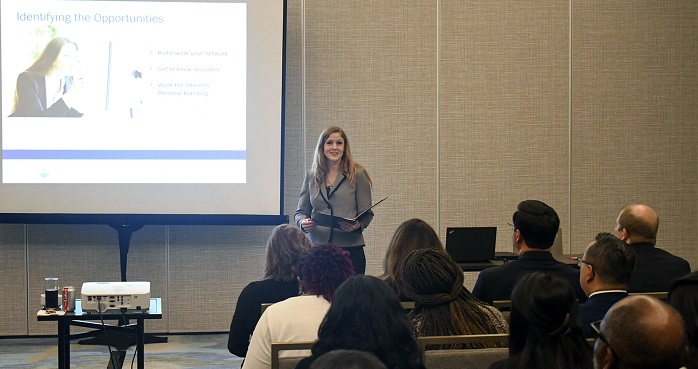

I recently had the honor of co-presenting with Mike McBride, Regional President and COO of Ascension St. John, at the American College of Healthcare Executives - Southeast Texas Chapter’s conference in Houston. Our session, “Identify Your Next Career Move,” took the attendees through what makes up a successful career transition -- from self-branding to job interview preparation and all the steps in between.
Key takeaways from our presentation:
Access your mindset
Are you a glass-half-full type of person? Are you in a dark place in your current workplace? Building confidence is a key ingredient to success. To enter a transition without the highest level of confidence is a formula for failure. You must rebuild confidence before you start.
Unpack your baggage
At a certain point in our lives we all acquire baggage. That's a given. It's what you do with that baggage that matters most. Have you shoved it to the back of your closet to deal with later, or is it neatly unpacked and sorted and processed? If it is the former, then you have work to do. You will not make headway in a job search until you have dealt with your baggage.
Speak to your achievements
How are you at speaking to your abilities and achievements? If you cringe at the thought or don't know where to start, you have some work to do before you are ready to make your next career move. Never assume that the person interviewing you will read between the lines just because you have it as a bullet on your resume -- you must verbalize it.
Know your value
What is your superpower? Determine what differentiates you from other people who may be competing for the same job. If you are having trouble determining what makes you different, form an informal advisory board made up of close friends and colleagues. These are the people you can not only trust to tell you what your strengths are, but also areas where you can improve.
Develop your criteria
Create a list -- in priority order -- of factors that matter to you as you seek a new opportunity. Culture and mission should always rank somewhere on the list, but should also include personal factors that are specific to your work/life situation. Use this list as a guide when you determine if an opportunity is right for you.
Identify and research target organizations
Develop a list of companies and organizations that you have a strong interest in. Why are you interested in each of these companies? Be specific, and if they don’t align with your criteria list, then revise. If they do, research them thoroughly. Start connecting with individuals who work at this company on LinkedIn and developing genuine relationships within these organizations.
Build and work your network
Research shows that you will find your next opportunity through someone you know. A good, quality network takes work. You must be intentional and consistent in your outreach efforts to nurture and grow your network. Set aside time each week to focus on cultivating relationships within your industry.
Polish and build your professional brand
You are how others perceive you to be. Your brand includes everything from your resume to what shows up when your name is searched for online. While some perceptions can be outside the realm of your control, many are controllable. You can create the professional image you want to portray. Areas include your:
- Resume
- Verbal self-introduction (Answers “Tell me a little bit about yourself.”)
- LinkedIn profile
- Google search results (Are they positive/negative/neutral?)
Own the interview
Once you have an interview scheduled -- investigate, practice and prepare. Research those interviewing you. Reach out to network connections that may have inside knowledge of the culture of the organization or might provide you with a connecting point that could prove invaluable once in the interview. Practice your talking points out loud or with a trusted friend. Be prepared to explain an awkward exit from a previous position or extended career gaps on your resume.
While sometimes it takes seeing a certain job posting to spark your desire for a career change, it’s far more effective to begin working on the areas above well in advance of that moment. That way, when the right opportunity does come along, you are ready to start that journey.

























